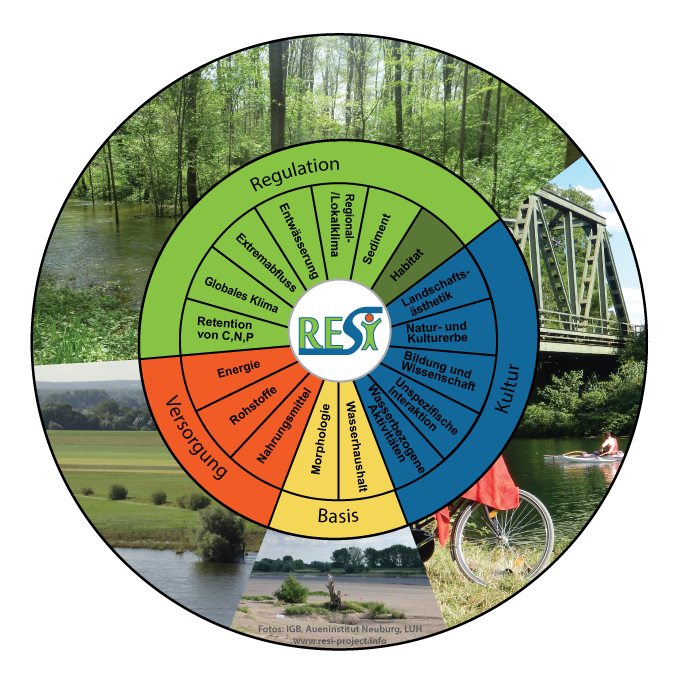Ecosystem Services
has been developed implicitly by several authors during the second half of the 20th century, when it became clear that the natural fundaments of human civilisation might be in danger. The term ‘services’ has been defined for the first time within an article in ‘Science’ (WESTMAN, 1977). The combined term “ecosystem services” was first used by EHRLICH & EHRLICH (1981). Thereby, the development of this term was linked with the term of sustainability. In the report ‘The Limits to Growth’ to the Club of Rome in 1972 (MEADOWS et al. 1972) had applied the term ‘sustainability’ for the first time on the general development of the globe, and it was fundamentally defined in the year 1987 by the UN-World Commission on Environment and Development in the ‘Brundtland Report’. The recognition- already implicitly included in the ‘Brundtland Report’- that the natural resources are important for the further development of the humanity, was subsequently identified by DE GROOT (1987) and CONSTANZA (1991) as a tool to re-connect the sciences of ecology and economy, which had been separated since the 19th century, in view of the of the limitations of economic growth by ecological restrictions. The factually irrefutable basic embedding of economy into the ecological framework conditions became more manifest through a further elaboration (DAILY 1 1997, DE GROOT et al. 2002) of the concept of ecosystem services, whereby it caused significant repercussions in society (DAILY et al. 2009, DE GROOT et al. 2010).
of ecosystem services has further been raised through the appearance of the Millennium Ecosystem Assessment report in 2005, where direct and indirect ecosystem services have been systematised and definitely named, such as cultural services (as recreation and aesthetic experiences), supporting services (like soil formation, photosynthesis or nutrient cycling), provisioning services (as food, water, fibre or wood) and regulating services (as regulation of climate, floods or water quality) (DE GROOT et al. 2010). In the Millenium Ecosystem Assessment report, the degree of degradation of ecosystem services was analysed, too, and was linked to the worldwide fight against poverty (MA 2005).
At the Millennium Ecosystem Assessment report it is stated explicitly that a lot of ecosystem services are provided with contribution of organisms, and that those services can be affected by reduced biodiversity (MA 2005). As a result, the influencing factors on the provision of ecosystem services are investigated intensively. Since half of the world population is living in a distance of less than 3 km to the next inland water body, a major part of ecosystem services that is used probably is provided by inland waters. Therefore, the preservation of the integrity of inland waters represents a necessary prerequisite not only for the preservation of the high biodiversity of inland waters (BALIAN et al. 2007, TAYLOR et al. 2006), but also for a high availability of ecosystem services in river corridors.
its monetization and internalization, i.e. the conception of payments by the users of these services after the polluter-pays principle. Thereby the impacts and costs arising through the (over-)use of the ecosystem services should be compensated to the benefit of other members of the society (e.g. GÓMEZ-BAGGETHUN 2009), including the mitigation of produced impacts in order to avoid the tragedy of the commons (HARDIN 1968). However, several ecosystem services may only be quantified with difficulties, especially such appearing at large-scale, regulating and cultural services or ecosystem services that may gain appreciation in future, as the use of the genetic resources generated by a high biodiversity (DE GROOT et al. 2010).
Improving the implementation of the ecosystem service concept hence represents a topical research field internationally, especially concerning its economic valuation, identification of the real or potential users, as well as in respect of the involvement of stakeholders in implementation. Generally, the biggest challenge is seen in an integrative research, which addresses for instance the trade-offs between the uses of various ecosystem services (NATIONALES KOMITEE 2011). In order to increase the political effectiveness of the ecosystem service concept, there is still a societal framework missing beyond its mentioning in the EU-Biodiversity strategy, which would the societal benefit of the concept enable to find its way into political decision-making (DAILY et al. 2009) or finally into practical landscape-planning (DE GROOT et al. 2010).

